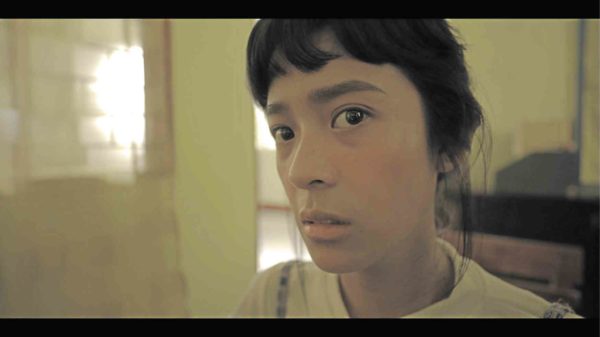CineFilipino shorts: Length doesn’t matter
Apart from the eight full-length feature films in the main tilt, this year’s CineFilipino fest is also a showcase of 17 short films, made by student and professional directors.
Madonna Tarrayo, CineFilipino festival director, explains that this year’s short films are “quite bold and varied.”
Organizers screened over 300 entries, before narrowing down the lineup to seven entries in the student division and 10 finalists in the open category.
Let’s hear it from the filmmakers:
Coleen Tanco’s “Rufyla” shows life “in a remote area in southern Philippines.” The director highlights the struggles of indigenous people and shows viewers that our culture is “not worthless.”
Gio Potes relates that “Mark & Lenny” presents the “extreme prejudice” faced by “activists and gays alike.” “I want the audience to see that they’re human, too. They eat, breathe, sleep and, most of all, fall in love.”
Article continues after this advertisementDexter de Jesus’ “Binata Na” was inspired by “news of the birth of the 100 millionth baby.” “It’s not a personal story. It’s about taking responsibility, curiosity, youth and family issues.”
Article continues after this advertisementRaiza Masculino, the director behind “Amusin Pa,” veers away from the usual rom-com narrative by setting her film in her hometown (Marinduque). “Love is everywhere. Sometimes, we just need to live in the moment and make the best of it.”
Tim Villanueva envisions “Santa Nena!”—his “last undergraduate film in Benilde—to be a special gift to God.” The film, however, tackles “human desires … erroneous worship [that] lead people to commit sins, resulting in chaos.”
The idea behind Austin Tan’s “Happy Birthday, Mylene! 2023 Ka Na” came from a night of watching news on TV: Witnessing the brutal slaying of teenager Kian delos Santos and the conflict in Marawi. The UP student trusts that the film will make viewers “realize that they need to act … and initiate change in society.”
Joshua Tayco, the director of “Tugma,” was immersed in the world of spoken-word poetry in La Salle as a student. With this film, he wishes to immortalize “the beauty of our own language.”
The entries in the open category zoom in on a variety of issues, as well.
April Aspiras, the director of “Si Aponibolinayen at ang mga Batang Lumilipad,” seeks to “explore our oral folklore traditions, which are dying because they’ve been forgotten.” She hopes to “raise awareness on the plight of the lumad.”
Like most kids who “watched too much television” in the 1990s, Stephen Lopez, the director of “Gabi ng Kababalaghan,” was exposed to a slew of old horror flicks and Halloween specials, along with “sensationalized news reports of crime and mayhem.” He expressed the hope that today’s kids would also check out our own myths and legends, “to maintain our cultural identity as Filipinos.”
Mark Frondoza’s “.raw” compares the “unedited and edited” versions of a prenup video. “We are in the digital era … it’s easy to construct a façade of a perfect life.” He isn’t against wedding videos per se, but insists that “we shouldn’t base our own relationships on the things we see online.”
In Jude Matanguihan’s “Luisa at Guada,” golden oldies take center stage. “I thought of my own lola,” says Matanguihan. It’s about “appreciating time.” “Seniors don’t waste time on things that don’t exist and focus on things they can accomplish.”
The “My Way” murders serve as the basis of Miguel Fernandez’s “Lasingtunado.” Belting out the Frank Sinatra hit has sparked fights in karaoke bars. It explores how “uncontrolled machismo can lead people to do stupid things.”
The goal of MG Bayani, the writer-director of “Ate, Kuya, Gusto Kong Kape,” is to make a film on how a “conversation can drastically change the government … and threaten the fabric of Philippine politics.”
Katrina Banaag, the director of “Duyan ng Alon,” believes that children are “powerful storytellers.” More than a kiddie tale, this film challenges people to take “the most important adventure of all … conquering ourselves.”
Arjanmar Rebeta’s “Palabas” asks a simple question: “Despite the political intrigues, how can we promote our country to the rest of the world?” In the end, Rebeta asserts that the “image” of a country depends on the behavior of both the government and ordinary citizens. “Everyone is an active image of the nation.”
Josel Fajardo, the director of “Boyet Loves You,” came up with the film’s concept while using the loo on Earth Day with his cameraman. “The lights were turned off, so we had to use our cell phones in the dark.” The experience led to an engaging conversation on faith and history. “It was a joke that turned serious.”
Jarell Serencio’s “Siyudad sa Bulawan” was based on a real-life mining tragedy that killed children in Mt. Diwalwal, Compostela Valley.
“The issue is still relevant today,” Serencio explained. “Film is a medium that not only entertains, but also enables viewers to see other realities. It is a filmmaker’s job to take viewers to other places, to introduce them to unfamiliar people.”
The CineFilipino fest is ongoing in Gateway, SM Cinemas (under Cine Lokal) and Greenbelt 1 until May 15.


